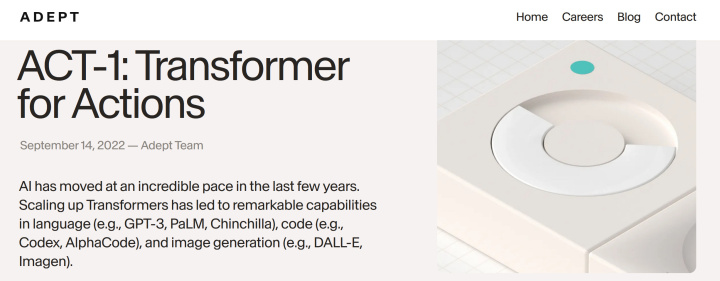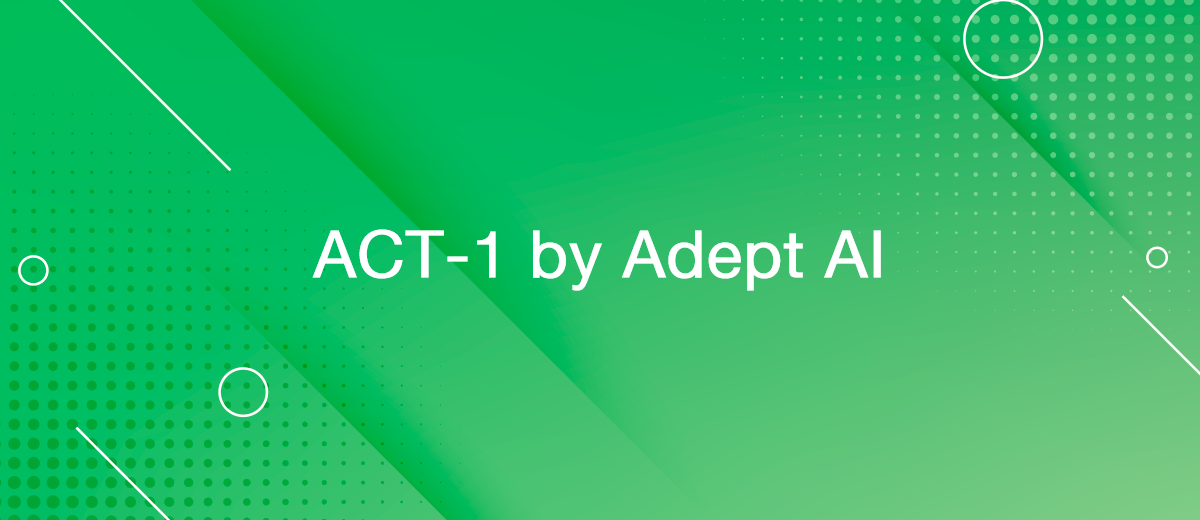Adept AI's ACT-1: Revolutionizing Human-Computer Interactions
The recent surge in technology has spotlighted the innovation of generative neural networks and advanced chatbots, exemplified by solutions like ChatGPT. Yet, the landscape is evolving with the emergence of versatile neural networks capable of a broader spectrum of tasks. This article introduces ACT-1, the inaugural AI model in this new category, developed by Adept AI.
The Genesis and Evolution of Adept AI
Launched in San Francisco in 2022, Adept AI emerged from the collective expertise of ex-OpenAI, Google, and DeepMind talents, with David Luan, a former leader at Google's large language model program and OpenAI's technical department, at its helm. Leveraging their rich background in notable AI projects, the team at Adept AI crafted an innovative neural network, culminating in the unveiling of ACT-1. This AI assistant's debut propelled the startup to secure $350 million during a Series B funding round in March 2023, ballooning its valuation to $1 billion with total funds raised reaching $415 million. Under the guidance of CEO David Luan, the influx of capital is earmarked for team expansion and AI model refinement.
Collaborating with Oracle and Nvidia, Adept AI harnesses extensive computing power to advance AI and machine learning models. Rather than pursuing an all-knowing AI, the focus is on creating a versatile tool that bridges human-digital interaction, enhancing efficiency and productivity. Through integrating computer vision and machine learning, this model continuously evolves, offering an intuitive interface for managing digital tasks.
What is ACT-1?

Adept's inaugural innovation, ACT-1, represents a leap in AI with its "Action Transformer" capability, seamlessly integrating with digital environments. Unlike traditional models, ACT-1 interprets visual data to execute complex software tasks, embodying a sophisticated human-computer interface. It's built on the Fuyu-8B model, enhancing interaction by processing screen images to perform designated actions. This system thrives on reinforcement learning for versatility in digital tasks, primarily on desktop interfaces, boasting rapid data processing and adeptness in visual tasks, setting a new standard for AI agents.
The Fuyu-8B model, available under the CC-BY-NC open license, encourages the community to integrate it into various AI endeavors. Adept AI has also been working on an advanced Fuyu-Medium network, currently under review. As Fuyu-8B serves as a pioneering test model, it comes without detailed instructions for customization, leaving users to adapt it for their specific needs independently.
Exploring the Applications of the ACT-1 AI
The ACT-1 AI, developed by Adept, showcases its adaptability by managing complex tasks across a variety of software. Its early proficiency was demonstrated with internet browsers, notably through integration with Google Chrome in a demo setup. This connection enabled ACT-1 to navigate web pages, executing actions like typing, clicking, and scrolling, highlighting its potential in automating and streamlining digital interactions.


The interface of the action-transformer, such as ACT-1, overlays a window on browsers or software, facilitating multiple actions via its self-learning capabilities. This includes transferring URLs to software, internet searches, and spreadsheet management. Users input commands into a dialog box, activating ACT-1 for efficient task completion. This is particularly beneficial for tasks requiring extensive manual input, where what previously needed numerous clicks can now be achieved with a simple text command.
Core Skills of Adept AI's ACT-1:
- Grasping data visuals: ACT-1 exhibits comprehensive data interpretation, answering complex questions via graphs and charts.
- Document analysis: It adeptly handles various document formats, including Word, Excel, PDF, and intricate infographics.
- Precise localization: ACT-1 pinpoints text and UI elements within images for accurate identification.
- Internet research: The AI seeks online information for unanswered queries or unclear instructions.
- Learning from feedback: ACT-1 continually refines its performance based on user input, enhancing accuracy and efficiency.
Future Directions and Hurdles for Adept AI Initiatives
Skilled AI researchers have high confidence that action transformers will significantly enhance the pace and efficiency of human-computer interaction in the forthcoming years. Instead of relying on a graphical interface, individuals will be able to command it using natural language, directly instructing their computers on what tasks they need to perform. Neural networks will aid novice users in quickly and efficiently mastering software, enabling them to bring their ideas to life even without prior skills or experience.
Documentation, guides, and FAQs will be designed for AI systems rather than human users. This means people will no longer need to dive into the intricacies of each program's interface or search for information online, as language models will handle these tasks. The potential applications of action transformers, such as ACT-1, extend beyond mundane office tasks. The enhanced capabilities of artificial intelligence will position it as a valuable contributor to research in numerous complex and vital industries, including engineering, pharmaceutical development, and more.
However, the pursuit of improved action neural networks also brings forth certain challenges. Developers acknowledge that the AI models they've created can potentially harm individuals if misused. Consequently, they place great emphasis on gathering user feedback and employ a combination of machine learning and incremental deployment techniques. Nevertheless, security remains a pivotal concern in the broader context of artificial intelligence technologies, extending beyond just the Adept product.
Bottom Line
In conclusion, Adept AI's ACT-1 emerges as a transformative force in human-computer interactions, embodying a future where digital tasks are executed through natural language commands. This paradigm shift, propelled by the fusion of artificial intelligence with human intent, promises not only to streamline routine tasks but also to unlock new frontiers in complex fields. However, the journey forward is twofold, balancing the immense potential of action transformers with the imperative of addressing ethical and security challenges inherent in AI advancements.
Routine tasks take a lot of time from employees? Do they burn out, do not have enough working day for the main duties and important things? Do you understand that the only way out of this situation in modern realities is automation? Try Apix-Drive for free and make sure that the online connector in 5 minutes of setting up integration will remove a significant part of the routine from your life and free up time for you and your employees.

